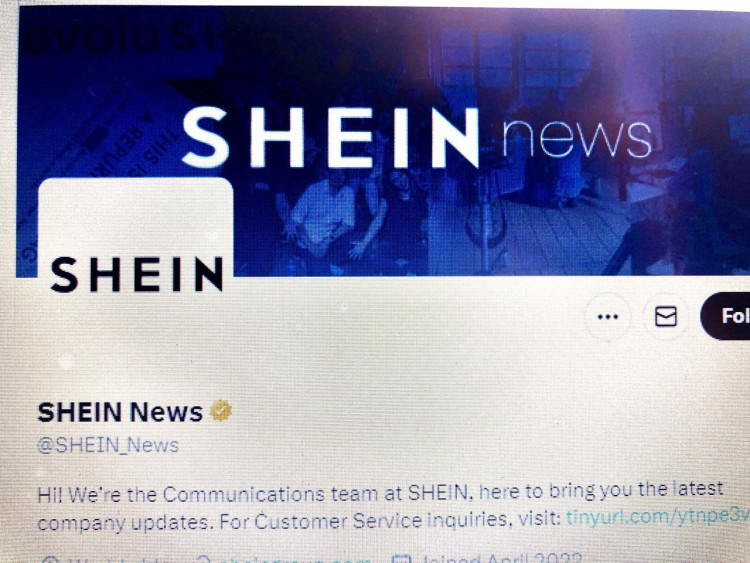In the rapidly evolving world of fast fashion, Shein, a digitally native retailer, has emerged as a formidable player. With its roots in China and now headquartered in Singapore, the company's ambitions to go public in the U.S. have been met with both anticipation and skepticism.
Shein's rise to prominence during the Covid-19 pandemic was nothing short of meteoric. Fashion enthusiasts worldwide were captivated by its vast assortment of trendy designs offered at astonishingly low prices. Behind the scenes, the company's valuation soared to a staggering $66 billion. Donald Tang, a former investment banker at Bear Stearns, has been appointed as the executive chair, becoming the public face of this fast-fashion behemoth.
However, the journey to Wall Street is fraught with challenges. Shein's ties to China have raised eyebrows, especially amidst allegations of using forced labor in its supply chain, potential violations of labor laws, environmental concerns, and accusations of design theft from independent artists.
Addressing these concerns head-on, Shein has been proactive in its efforts to gain the trust of U.S. regulators and Congress. The geopolitical tension between the U.S. and China has only intensified scrutiny of businesses with Chinese origins. Matt Kennedy, a senior IPO market strategist for Renaissance Capital, emphasized the importance of a "straightforward story" for potential IPO investors.
Shein's potential involvement with forced labor, particularly in China's Xinjiang region, has been a significant point of contention. The U.S. has banned imports from Xinjiang due to evidence of forced labor and human rights abuses against the Uyghur ethnic group. Shein's unique business model, which often involves shipping products directly to American consumers from its network of Chinese suppliers, has raised concerns about the possibility of circumventing these bans.
In response to these allegations, Marcelo Claure, Shein's group vice chair and former SoftBank CEO, has vehemently denied any involvement with forced labor. He emphasized the company's commitment to abiding by local laws and cooperating with investigations. Furthermore, Shein has acknowledged the presence of Xinjiang cotton in its raw materials and has taken steps to eliminate its use.
Beyond labor concerns, Shein's decision to move its headquarters to Singapore is seen as a strategic move to distance itself from the increasing regulatory scrutiny in China. However, this hasn't entirely alleviated concerns from U.S. lawmakers, who remain wary of potential data security risks and the company's ties to the Chinese government.
Another challenge facing Shein is the frequent allegations of copyright infringement. The company has faced legal battles over claims of design theft. In response, Claure stated that while mistakes can happen, Shein has a "zero tolerance policy" for copyright infringement.
Environmental concerns also loom large. The fast-fashion industry is often criticized for its environmental impact, with concerns about sustainability and the potential for products to end up in landfills. Shein, while acknowledging these challenges, has been transparent about its greenhouse gas emissions and is actively working towards more sustainable practices.
Shein's Ambitious Expansion in Latin America: A Focus on Brazil-Made Products
Shein, the Chinese fast-fashion e-commerce giant, has unveiled plans to amplify its presence in Latin America by 2026. Fabiana Magalhaes, the company's Brazilian production director, disclosed that Shein intends to distribute products crafted in Brazil throughout various Latin American markets. This initiative follows the company's recent foray into Brazilian manufacturing, marking its inaugural production venture outside its home base in China. By 2026, the company aspires for a significant 85% of its Brazilian sales, encompassing third-party vendors on its platform, to be locally produced.
Magalhaes, during a media briefing at Shein's Sao Paulo headquarters, emphasized Brazil's potential as a hub to cater to the broader Latin American region. Shein's proactive approach is evident in their internal research to facilitate these exports. While specific target countries remain undisclosed, the company's expansive reach, spanning over 150 nations since its inception in 2008 in Nanjing, speaks volumes.
Brazil, a pivotal market for Shein and its largest in Latin America, has witnessed the company's substantial investment commitment. Earlier this year, Shein pledged a whopping 750 million reais (approximately $148 million) to foster a robust manufacturing network in Brazil. This investment has already borne fruit, with 336 manufacturing partnerships established, and 213 actively producing apparel across a dozen Brazilian states.
Shein's manufacturing strategy in Brazil zeroes in on products that ensure competitive pricing, such as jeans and knitwear. While shirts are on the exploration radar, certain categories like winter attire present local production challenges. Beyond Brazil, Shein's global footprint is expanding, with manufacturing endeavors in Turkey and forthcoming plans for a Mexican factory.
Shein's aspirations to go public in the U.S. are clear, but the path is riddled with challenges. The company's ability to navigate these hurdles, maintain its core business strategy, and adapt to the evolving global landscape will determine its success on Wall Street.






